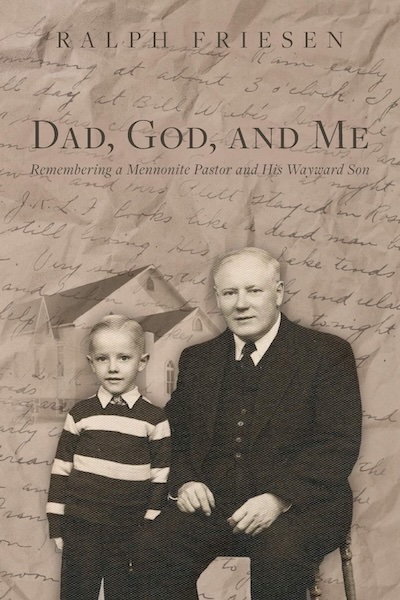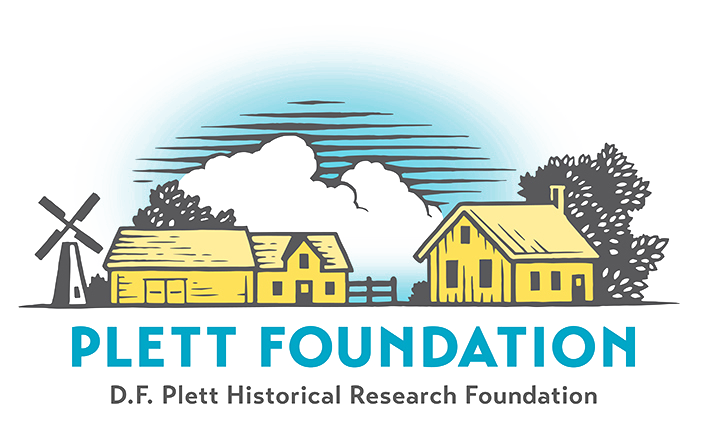Review: Dad, God, and Me
Glen R. Klassen
Dad, God, and Me: Remembering a Mennonite Pastor and His Wayward Son
By Ralph Friesen
Victoria: FriesenPress, 2019
pp 275. Softcover
Reviewed by Glen R. Klassen

Ralph Friesen presents a well-researched biography of his father, Peter, entwining it with his own autobiography. Peter grew up in a tranquil community of Kleine Gemeinde Mennonites, second-generation Canadians who were navigating the transition from farm life to entrepreneurial agribusiness. They were confident people, very aware of a supervising church and somewhat wary of the God it represented. They lived in hope of salvation but never presumed to claim it absolutely.
The author does not pretend to speak for his father. When Peter speaks it is from his diary or his letters, in direct quotes. There is no doubt about what he believes and what he passionately preaches. It is not a pretense; he is not a hypocrite. He may at times be uncomprehending and inadvertently cruel, but this is how parenting was done in those days.
In the 1940s and ’50s church life was disrupted by revivalist bombshells. Many emerged with changed and joyful lives, but by the 1960s, when Ralph was a teenager, a darker vision dominated these gatherings, as evangelists began to focus on fire and brimstone. The early converts of the era of revivalism, often leaders within their congregations, had to go along with this drama as the terrified people came forward. Not until the transgressive Sutera Twins in the 1970s had their stints in Steinbach did the church leadership wake up to this travesty of the gospel.
Nevertheless, the Rev. P. D. Friesen was one of the best-loved ministers in the Steinbach Evangelical Mennonite Church. He wanted to be “traditional” like bishops Peter P. Reimer or David P. Reimer but he also ran with activists like Ben D. Reimer, John Peters, and Archie Penner. Not that these groups of men were antagonists: they gladly washed each other’s feet. And both traditionalists and activists were very confrontational. Traditionalists would question your lifestyle to your face (“We heard that you chaperoned a high school dance . . .”), while the activists would think nothing of ganging up on a thirteen-year-old at Bible camp. But “Rev P. D.” was loath to confront.
I looked for judgmental or sarcastic references to the many Steinbach men and women named in the book, but found little. Even the notorious Hyman Appelman, who held sway at the Gospel Tabernacle, gets a pass. Several Steinbach grandees are lashed with a wet noodle. Others get grateful acknowledgement: Cornie P. Loewen, Henry B. Peters, and Wilma (Toews) Doerksen, among others. My dear brother is the bewildered Sunday school teacher who has to face hostile questions from Ralph and his best friend Patrick Friesen. I myself feel that I let the boys down by not revealing my own doubts, especially my disbelief in hell. At the University of Winnipeg Ralph finds surrogate fathers in Jack Thiessen and Carl Ridd.
This biography/autobiography necessarily becomes a family history, at least as it was in the 1950s and ’60s. Thanks Alvin, Donald, MaryAnne, and Norman for letting your kid brother reveal so much about your childhood and youth. The Friesen home was traditionally patriarchal but the members sensed that they had quite a bit of freedom to go their own way. They were seldom confronted directly and were not forced into anything. The force that did exist was emotional and religious. As Ralph writes, “Religion bound us together, and kept us apart” (13).
This dysfunction was blamed on “religion” or “the Church” or even “God.” Who is this “God”? The book’s cover picture shows the 1950s Steinbach EMC church between the father and son, and the title has God, presumably the EMC God, between “Dad” and “me”. Could it be that this God, by inspiring fear, gets in the way of human flourishing? When the church building burns in 1960, Rev. Peter is anguished while 15-year-old Ralph and his friend Patrick mock the loss, openly celebrating it.
It is puzzling that a congregation which loved to sing “Gott ist die Liebe . . . Er liebt auch mich” should be afraid of God. This fear of God distorted everything in Ralph’s teenage world. Upon entering the Gospel Tabernacle in Steinbach you were immediately confronted by a giant banner quoting Amos 4:12: “Prepare to Meet Thy God.” Amos’s God was extremely punitive toward a wayward Israel, promising the most horrible suffering, but never does that God promise eternal torture. Yet this is what was routinely threatened from the revivalist pulpit. No wonder that it crushed the normal happy interplay between parent and child. In his final dialogue with his absent father Ralph reassures him that he need not worry, that his son, Peter Ralph, will be all right.
Of all the things Ralph reveals about his father, what I found most surprising was that this Mennonite man, although seduced by a fundamentalist vision, was a romantic at heart. Released from his inhibitions by the stroke, he shows himself to be deeply emotionally attached to his partner and his family. Earlier we sometimes catch glimpses of a soul in love with the world of nature and sometimes deeply moved by the works of humankind. Although firmly pacifist, he allowed his son (Vern) to display a huge balsa model of a fighter jet in his shop’s front window. We saw only the beauty of its sleek lines and did not think much further.
The book ends with mixed outcomes. The scars remain but the three generations of Friesens, after calling on God, return to the machine shop, the watch repair and book shop, and to the world of nonfiction writing. I hope we get more of the same.
